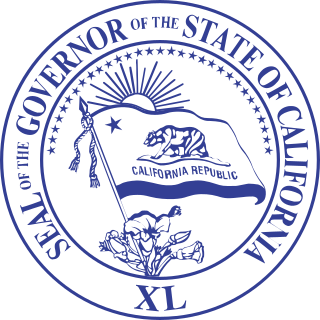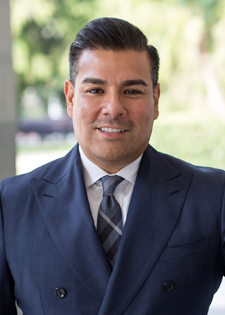
The governor of California is the head of government of the U.S. state of California. The governor is the commander-in-chief of the California National Guard and the California State Guard.
The government of California is the governmental structure of the U.S. state of California as established by the California Constitution. California uses the separation of powers system to structure its government. It is composed of three branches: the executive, consisting of the governor of California and the other constitutionally elected and appointed officers and offices; the legislative, consisting of the California State Legislature, which includes the Assembly and the Senate; and the judicial, consisting of the Supreme Court of California and lower courts. There is also local government, consisting of counties, cities, special districts, and school districts, as well as government entities and offices that operate independently on a constitutional, statutory, or common law basis. The state also allows direct participation of the electorate by initiative, referendum, recall and ratification.

The U.S. Economic Development Administration (EDA) is an agency in the United States Department of Commerce that provides grants and technical assistance to economically distressed communities in order to generate new employment, help retain existing jobs and stimulate industrial and commercial growth through a variety of investment programs. EDA works with boards and communities across the country on economic development strategies.

Gavin Christopher Newsom is an American politician and businessman serving since 2019 as the 40th governor of California. A member of the Democratic Party, he served as the 49th lieutenant governor of California from 2011 to 2019 and the 42nd mayor of San Francisco from 2004 to 2011.

The lieutenant governor of California is the second highest executive officer of the government of the U.S. state of California. The lieutenant governor is elected to serve a four-year term and can serve a maximum of two terms. In addition to largely ministerial roles, serving as acting governor in the absence of the governor of California and as President of the California State Senate, the lieutenant governor either sits on many of California's regulatory commissions and executive agencies.

Fiona Ma is an American politician and accountant. She has been serving as the California state treasurer since January 7, 2019. She previously was a member of the California Board of Equalization (2015–2019), the California State Assembly (2006–2012), and the San Francisco Board of Supervisors (2002–2006).

John Raymond Garamendi is an American businessman, politician and member of the Democratic Party who has represented areas of Northern California between San Francisco and Sacramento, including the cities of Fairfield and Vacaville in the United States House of Representatives since 2009. Garamendi was the California insurance commissioner from 1991 to 1995 and 2003 to 2007, the U.S. Deputy Secretary of the Interior from 1995 to 1998, and the 46th lieutenant governor of California from 2007 until his election to Congress in late 2009.

The California Public Utilities Commission is a regulatory agency that regulates privately owned public utilities in the state of California, including electric power, telecommunications, natural gas and water companies. In addition, the CPUC regulates common carriers, including household goods movers, limousines, rideshare services, self-driving cars, and rail crossing safety. The CPUC has headquarters in the Civic Center district of San Francisco, and field offices in Los Angeles and Sacramento.

The California executive branch consists of elected officers and other offices and officers. The elected executive officers are:
The New Jersey State Auditor is a constitutional officer appointed by the New Jersey Legislature and administratively placed within the Office of Legislative Services. The Auditor conducts financial and performance audits of State agencies, certain school districts, and vicinages of the Judiciary. The State Auditor also conducts studies on the operation, economy and efficiency of State-run or State-supported programs.

The California Department of Finance is a state cabinet-level agency within the government of California. The Department of Finance is responsible for preparing, explaining, and administering the state's annual financial plan, which the governor of California is required under the Constitution of California to present by January 10 of each year to the general public. The Department of Finance's other duties include analyzing the budgets of proposed laws in the California State Legislature, creating and monitoring current and future economic forecasts of the state, estimating population demographics and enrollment projections, and maintaining the state's accounting and financial reporting systems.

The California Environmental Protection Agency (CalEPA) is a state cabinet-level agency within the government of California. The mission of CalEPA is to restore, protect and enhance the environment, to ensure public health, environmental quality and economic vitality.
The California Health and Human Services Agency (CHHS) is the state agency tasked with administration and oversight of "state and federal programs for health care, social services, public assistance and rehabilitation" in the U.S. state of California. The agency is headed by the Secretary of the California Health and Human Services Agency, with headquarters in Sacramento. Many of the laws in the California Health and Safety Code are enforced by CHHS components.
The CaliforniaLittle Hoover Commission (LHC), officially the Milton Marks "Little Hoover" Commission on California State Government Organization and Economy, is an independent California state oversight agency modeled after the Hoover Commission and created in 1962, that investigates state government operations and promotes efficiency, economy and improved service through reports, recommendations and legislative proposals.
The Commission on the Reform of Oklahoma State Government, also known as the Nigh Commission, was a committee that in 1984 recommended sweeping changes to the government of the State of Oklahoma to improve efficiency, economy and service. It is named after former Governor of Oklahoma George Nigh, who appointed the Commission.

Eleni Kounalakis is an American politician, businesswoman, and diplomat serving as the 50th lieutenant governor of California since 2019. A member of the Democratic Party, she is the first woman and the first Greek American elected to the office.

The 2014 California lieutenant gubernatorial election was held on November 4, 2014, to elect the lieutenant governor of California. Incumbent Democratic lieutenant governor Gavin Newsom ran for re-election to a second term in office.

Kate Gordon is an American lawyer, urban planner, non-profit advisor, and leader in the "green jobs" and climate risk movement. In 2021, she became Senior Advisor to Energy Secretary Jennifer Granholm at the United States Department of Energy. In 2019, she was appointed by Governor of California Gavin Newsom to lead the California Governor's Office of Planning and Research.

The Oregon Higher Education Coordinating Commission is a volunteer state board established in 2011 in the U.S. state of Oregon, with responsibilities for advising the governor, the legislature and the Chief Education Office on statewide postsecondary education policies and funding. The fifteen-member commission has authorities for "development of biennial budget recommendations for public postsecondary education in Oregon, making funding allocations to Oregon's public community colleges and public universities, approving new academic programs for the public institutions, allocating Oregon Opportunity Grants, authorizing degrees that are proposed by private and out-of-state (distance) providers, licensing private career and trade schools, overseeing programs for veterans, and additional legislative directives".

Soraya M. Coley is the sixth president of California State Polytechnic University, Pomona. With four decades of experience in higher education, Coley is the first woman and first African American scholar to be named president of Cal Poly Pomona.














